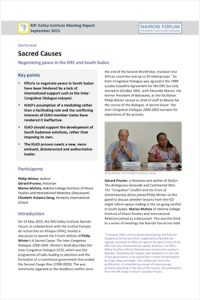Key points
• Efforts to negotiate peace in South Sudan have been hindered by the lack of a coherent international approach such as the Inter-Congolese Dialogue eventually enjoyed.
• IGAD’s assumption of a mediating rather than a facilitating role and the conflicting interests of IGAD member states have rendered it ineffective.
• IGAD should support the development of South Sudanese solutions, rather than imposing its own.
• The IGAD process needs a new, more eminent, disinterested and authoritative leader.
Participants
Philip Winter, Author
Gérard Prunier, Historian
Marius Mufuta, Hekima College Institute of Peace Studies and International Relations (Discussant)
Elizabeth Ashamu Deng, Amnesty International (Chair)
Introduction
On 19 May 2015, the Rift Valley Institute Nairobi Forum, in collaboration with the Institut français de recherches en Afrique (IFRA), hosted a discussion to launch the French edition of Philip Winter’s A Sacred Cause: The Inter Congolese Dialogue 2000-2003. Winter’s book describes the Inter Congolese Dialogue (ICD), which was the programme of talks leading to elections and the formation of a transitional government that ended the Second Congo War (1998-2003). The war, commonly regarded as the deadliest conflict since the end of the Second World War, involved nine African countries and up to 20 rebel groups.1 An Inter-Congolese Dialogue was agreed in the 1999 Lusaka Ceasefire Agreement for the DRC but only started in October 2001, with Ketumile Masire, the former President of Botswana, as the facilitator. Philip Winter served as chief of staff to Masire for the course of the dialogue. A Sacred Cause: The Inter Congolese Dialogue 2000-2003 narrates his experience of the process.
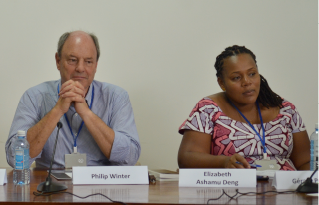
Gérard Prunier, a Historian and author of Darfur: The Ambiguous Genocide and Continental War: The “Congolese” Conflict and the Crisis of Contemporary Africa joined Philip Winter on the panel to discuss whether lessons from the ICD might inform peace making in the on-going conflict in South Sudan. Marius Mufuta of Hekima College Institute of Peace Studies and International Relations joined as a discussant. This was the third in a series of meetings the Nairobi Forum has held since the outbreak of war in South Sudan in late 2013. (See video and report of a January 2014 meeting South Sudan: Is peace possible? and report of a February 2015 meeting South Sudan: Beyond the ceasefire?)
Background
The civil war in South Sudan erupted in December 2013, when a power struggle within the ruling Sudan People’s Liberation Movement (SPLM) between President Salva Kiir and his Deputy, Riek Machar, deteriorated into a conflict between factions of the military loyal to each side. That conflict quickly escalated into a war between the Government of South Sudan and the forces loyal to Riek Machar, who named themselves the SPLM in Opposition (SPLM-IO). The war has engulfed ever-greater swathes of the country and, in many places, degenerated into brutal assaults on civilians. Repeated attempts to negotiate a sustained cessation of hostilities by the Intergovernmental Authority on Development (IGAD) have failed to stem the fighting or produce a political solution acceptable to the parties to the conflict. These failures have prompted calls for a wider African and international engagement in the peace process. IGAD, which includes Ethiopia, Kenya, Sudan, Uganda, Djibouti and Eritrea, would be joined by the African Union, the United Nations, the United Kingdom, the United States, Norway, China, Rwanda, Chad, and Algeria to form ‘IGAD Plus’.
Global disengagement
In seeking lessons for the South Sudanese peace efforts from the ICD, it is important to recognize the marked differences in the national and international contexts of each of these processes. The facilitators in the ICD process enjoyed the benefits of an era in which international players—the United Nations and the Western powers on the Security Council—were ready, albeit often reluctantly, to intervene in support of the process. It was also the heyday of the African éminence grise, with senior statesmen and leaders like Nelson Mandela, Thabo Mbeki, and Kofi Annan—men who were political kith and kin to Ketumile Masire himself—constituting a powerful corps of moral leadership that transcended personal and local interests. As Winter described, on several occasions when the ICD seemed doomed to run aground, some of these powerful players stepped in to get it back on track.
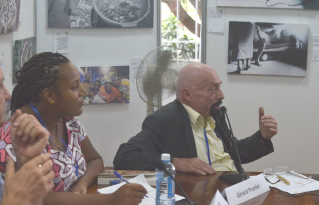 IGAD is operating in very different circumstances in South Sudan. ‘We are’, Winter observed, ‘witnessing a great weakening of Western hegemony’ in which African countries that used to fall under its aegis are coming into their own, politically and economically. Alternative poles of power—notably China—are emerging with enough force to weaken Western influence, but not enough to impose their will on Africa. At the same time, the conflict in South Sudan, devastating as it is, appears in the international consciousness as a relatively minor conflict in comparison to the turmoil in the Middle East. The United States, in particular, has lost interest in South Sudan as the latter’s prime antagonist, Khartoum, is no longer considered a sponsor of terrorism. In addition, Prunier surmised, the United States has been particularly reluctant to get involved in the South Sudan conflict because ‘South Sudan is largely a US product and Americans are frustrated that their darling regime has exploded in their hands; they are not willing to examine what they did wrong in midwifing this child.’
IGAD is operating in very different circumstances in South Sudan. ‘We are’, Winter observed, ‘witnessing a great weakening of Western hegemony’ in which African countries that used to fall under its aegis are coming into their own, politically and economically. Alternative poles of power—notably China—are emerging with enough force to weaken Western influence, but not enough to impose their will on Africa. At the same time, the conflict in South Sudan, devastating as it is, appears in the international consciousness as a relatively minor conflict in comparison to the turmoil in the Middle East. The United States, in particular, has lost interest in South Sudan as the latter’s prime antagonist, Khartoum, is no longer considered a sponsor of terrorism. In addition, Prunier surmised, the United States has been particularly reluctant to get involved in the South Sudan conflict because ‘South Sudan is largely a US product and Americans are frustrated that their darling regime has exploded in their hands; they are not willing to examine what they did wrong in midwifing this child.’
Furthermore, Prunier continued, while China’s considerable oil interests in South Sudan make it a natural candidate for intervention, ‘they are apprentice imperialists and out of their depth.’ China expected dramatic results from its intervention in South Sudan in January 2015, in which it broke its tradition of silence and urged an immediate end to hostilities. In the event its impact has been imperceptible. Thus, where the conflict in South Sudan is concerned, it is by necessity and aspiration, the age of African solutions to African problems.
IGAD’s burdens
IGAD appeared as the natural body to pursue peace in South Sudan because of its history with the Comprehensive Peace Agreement (CPA), but it faces a number of disadvantages. One is in its very constitution. The IGAD member states do not form or operate as a bloc of states with common interests and a coherent approach, and for none of them is peace in South Sudan a crucial national interest. It has been suggested that some IGAD member countries—Uganda, Kenya and Sudan—have interests that conflict with peace, either in maintaining an unstable South Sudan (Sudan, Uganda) or in maintaining advantageous relations with certain parties in the war (Kenya, Uganda). Winter pointed out, for instance, that Uganda’s President Yoweri Museveni intervened in the negotiations to ensure a balance between the vice presidency and the presidency that would suit his interests. In comparison, in the DRC, by and large, with the exception perhaps of one instance in which the United States and Belgium threatened the multilateralism of the ICD by supporting a bilateral agreement between Kinshasa and the MLC, the ICD facilitators did not have to contend with a similar lack of ésprit de corps and neutrality among the countries supporting the Dialogue.
IGAD’s mistakes
Nevertheless, Winter argued, IGAD could do things differently. In the case of the Inter-Congolese Dialogue, Sir Ketumile Masire’s team refused to do any mediation in the ICD, sticking instead to the task of facilitation. IGAD’s decision to mediate has put it in the difficult position of trying to craft a solution that should more properly emerge from the parties to the conflict themselves. IGAD, he charged, has also failed to change tack, despite seven unsuccessful cessation of hostilities agreements. Instead, it has repeatedly tinkered with the same approach of dividing the spoils of the state between the belligerents, none of whom have a predisposition for compromise.
IGAD has failed, moreover, to democratize the peace process. The ICD included political parties and civil society groups from throughout the DRC. IGAD, too, has committed to including civil society, political parties and churches. However, while members of Masire’s team criss-crossed the DRC in a major exercise of consultation with civil society and local political groups, IGAD has contented itself with receiving representatives in Addis Ababa. As a result, he said, IGAD is insulated from the ‘ground truth’.
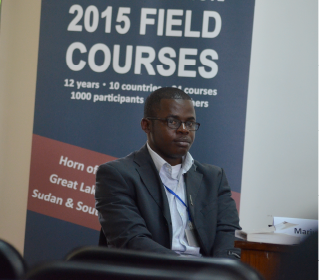 Speaking from the audience, Peter Adwok Nyaba, a former Minister in the Government of South Sudan, agreed that IGAD was compromised from the beginning of the negotiations, when Uganda took the side of the South Sudan government. He also argued that IGAD’s tendency to engage in negotiations with the parties can interfere with indigenous processes and jeopardize the resolution of the conflict.
Speaking from the audience, Peter Adwok Nyaba, a former Minister in the Government of South Sudan, agreed that IGAD was compromised from the beginning of the negotiations, when Uganda took the side of the South Sudan government. He also argued that IGAD’s tendency to engage in negotiations with the parties can interfere with indigenous processes and jeopardize the resolution of the conflict.
For example, he said, IGAD’s proposal for a power sharing agreement in June 2014 lapsed into a fruitless quarrel because IGAD mediators turned themselves into negotiators and argued with the parties. Notably, in September 2014, SPLM members in government, members of the SPLM-IO, and other SPLM political leaders met without IGAD and were able to reach an agreement. The next step would have been to bring the principals—Kiir and Machar—into the negotiations, but IGAD thwarted the process by insisting on involving political parties and civil society representatives. This imposition wasted a real opportunity for peace, Adwok said. The former Minister also found fault with the call by several members of IGAD Plus for the formation of a transitional government of national unity.2 He contended that the parties cannot discuss the formation of a government before a peace agreement is reached.
IGAD’s excuses
‘IGAD,’ Prunier argued, ‘can’t swim without water.’ Without international support for strong interventions, such as sanctions, and without a supportive environment in the region, the mediation team is forced to work with very limited options—attempting vainly to patch the SPLM back together by dividing government posts into various configurations they hope the members of the SPLM and SPLM-IO will accept.
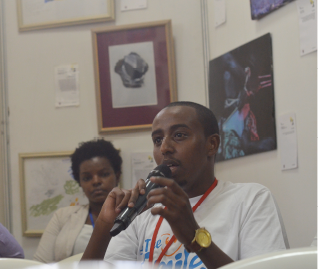 Yet one cannot blame Kiir or Machar, he said, for lack of faith in this kind of process. If the ICD team had been trying to piece together Mobutu’s single party they would have failed miserably. In South Sudan they know, Prunier argued, that it is a myth that the SPLM can be put back together, that the SPLM died with Garang. As leaders like David Yau Yau and Johnson Olony emerge to form their own armies and assert their own parochial claims and the war spreads to more regions, they are aware, he said, ‘that they are at deep bottom, that the country is melting before their eyes and may not even survive the year.’ Adwok, however, disagreed that SPLM reunification is impossible. He argued that the war started because of disputes and divisions within the party, if the SPLM were reunited, there would be no reason for the principals to continue fighting and it would be easy to reach a peace agreement.
Yet one cannot blame Kiir or Machar, he said, for lack of faith in this kind of process. If the ICD team had been trying to piece together Mobutu’s single party they would have failed miserably. In South Sudan they know, Prunier argued, that it is a myth that the SPLM can be put back together, that the SPLM died with Garang. As leaders like David Yau Yau and Johnson Olony emerge to form their own armies and assert their own parochial claims and the war spreads to more regions, they are aware, he said, ‘that they are at deep bottom, that the country is melting before their eyes and may not even survive the year.’ Adwok, however, disagreed that SPLM reunification is impossible. He argued that the war started because of disputes and divisions within the party, if the SPLM were reunited, there would be no reason for the principals to continue fighting and it would be easy to reach a peace agreement.
Can the IGAD-led process be saved?
Prunier was skeptical that IGAD, or IGAD Plus, or anything short of generational change will be able to usher South Sudan towards peace. The task, he observed, is far greater than the ICD task of stopping the fighting and concluding an agreement for the formation of an interim government. In South Sudan, the lack of a national identity, the weakness of civil society, the institutional resistance to a free press, the habitual use of violence in politics and, above all, deeply entrenched corruption—‘the institutionalization of looting’—that dates back to Ottoman times, make the task more elemental and more difficult than the one that that faced the DRC. ‘IGAD has failed,’ he said, ‘but we could not have expected them to do the undoable.’
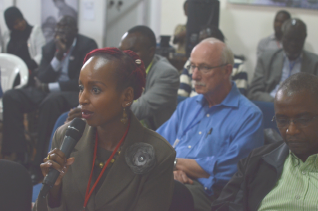 Marius Mufuta concurred that South Sudan needs simultaneous peace building and state building processes, and pointed out that the ICD fell far short on the latter. In the view of much of the DRC’s citizenry, he said, the ICD merely paved the way for an elite pact that licensed political parties to loot the country with impunity. He pointed out that the army in the DRC was yet to be reconstituted and remains weak, that large-scale violence continued in various parts of the country, and that the country was yet to undertake a credible national reconstruction and reconciliation process.
Marius Mufuta concurred that South Sudan needs simultaneous peace building and state building processes, and pointed out that the ICD fell far short on the latter. In the view of much of the DRC’s citizenry, he said, the ICD merely paved the way for an elite pact that licensed political parties to loot the country with impunity. He pointed out that the army in the DRC was yet to be reconstituted and remains weak, that large-scale violence continued in various parts of the country, and that the country was yet to undertake a credible national reconstruction and reconciliation process.
Winter, however, remained optimistic. IGAD’s failure to date has resulted largely, he said, from its lack of a leader of sufficient prestige and credibility. This has rendered the mediation team feeble and, even with the extension of IGAD into IGAD Plus, it will remain feeble unless it secures a leader of sufficient gravitas. What the IGAD team needs, Winter argued, is an African leader of the calibre of Joaquim Chissano, who transformed Mozambique from a war-torn country into a functioning democracy, or Jakaya Kikwete, who will soon be stepping down from the presidency of Tanzania and who has already shown, through his involvement in facilitating the Arusha Agreement, that he is familiar with South Sudanese challenges. These leaders, Winter said, are strong, credible and impartial.
However Daniel Deng, speaking from the audience, observed that South Sudan is hostage to other forceful regional leaders, who are not disinterested. He queried whether Museveni would accept an agreement facilitated by Kikwete, or whether Bashir would not seek to hinder any changes likely to bring lasting peace to South Sudan.
(Une cause sacrée: Le dialogue intercongolais, 2000-2003—the French edition of A Sacred Cause: The Inter-Congolese Dialogue 2002-2003—is available from L’Harmattan. The English edition can be purchased from Amazon.)
Notes
1. In August 1998, a Goma-based armed group, the Rally for Congolese Democracy (RCD), supported by Rwanda and Uganda, launched an offensive against the government of the DRC that soon threatened the capital, Kinshasa. The DRC’s fellow Southern African Development Community members, Namibia, Zimbabwe and Angola, soon stepped in on the side of the government, to be joined later in more limited fashion by Chad, Libya and Sudan. The conflict also led to the proliferation of a bewildering mosaic of armed groups, primarily operating in the East of the country. See publications from the Rift Valley Institute’s Usalama Project.
2. Foreign & Commonwealth Office. ‘Troika statements on South Sudan Peace Negotiations’. 23 January 2015. UKFCO Press Release. (https://www.gov.uk/government/news/troika-statement-on-south-sudan-peace-negotiations)

